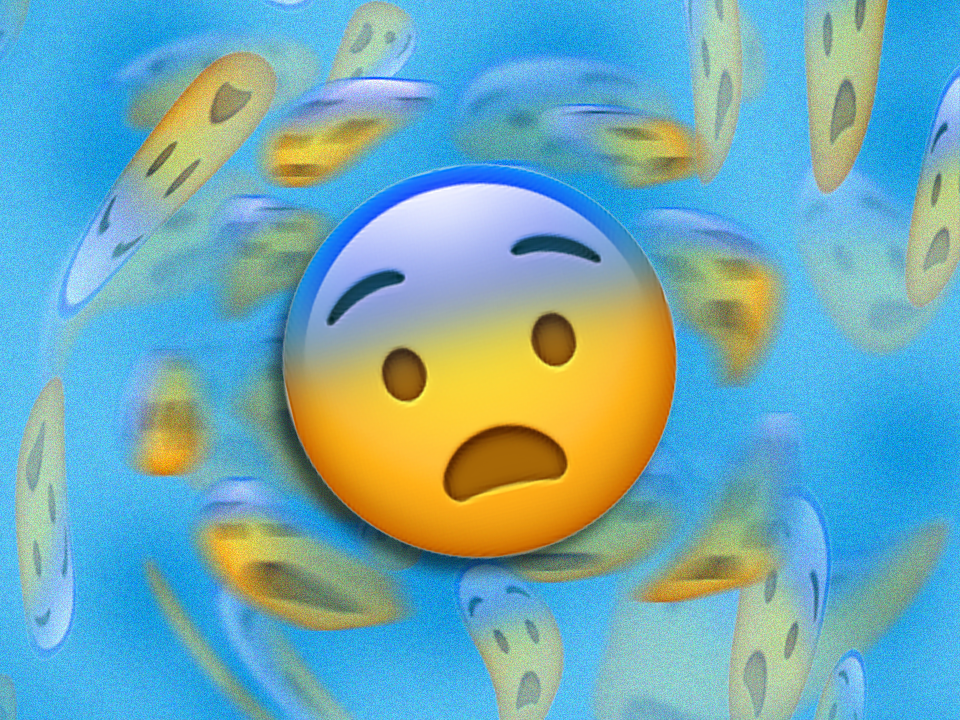12 People Break Down Exactly What a Panic Attack Feels Like
“I’m usually worried I’m dying.”
Back in college, I remember hunching over my dorm room toilet sobbing and hyperventilating. Dry heaves came in sudden and unexpected spurts. My chest was so tight I could barely breathe, and I genuinely thought I was going to die. This was my first panic attack (sometimes called an “anxiety attack”), and they’ve become a sort of recurring villain in my life ever since.
If you’ve never had one or you’re just not sure, you might be wondering what a panic attack feels like. The first thing you should know is that they can come on whether you’re already feeling anxious or totally chill. And when they strike, you might feel intense symptoms like heart palpitations, sweating, shaking, nausea, or chills, according to the Diagnostic and Statistical Manual of Mental Disorders (DSM-5-TR).
They can also trigger a choking sensation, tingling, an intense fear of dying, and stomach issues (before my first solo flight post-pandemic, I threw up and had such bad stomach issues—read: anxiety poops—that I nearly missed my plane). Yep, not ideal.
Unfortunately, panic attacks can happen to anyone. Most of the time, according to the DSM-5-TR, people who don’t have an anxiety disorder experience them in a stressful scenarios, like getting on a crowded plane or before speaking in public. That said, you may be more prone to panic attacks if you have an anxiety disorder.
While lots of people experience the occasional panic attack, frequent panic attacks that seriously disrupt your life can be a sign of panic disorder. People with panic disorder consistently have frequent panic attacks with no clear trigger (like right when they wake up in the morning) and spend weeks worrying about when the next one will come on and even avoiding the things they think might trigger it.
It’s a bummer, but we don’t really know what causes panic attacks. That said, big life changes, a family history, lots of caffeine or smoking, past trauma, and other factors might increase your chances of having one, according to the Mayo Clinic.
As frustrating as that is, you don’t just have to suck it up. Things like talk therapy, medication, or a combo of the two can help lessen your chances of having another panic attack or maybe just make them more manageable.
Whether you’ve just experienced your first panic attack or aren’t totally sure, we asked 12 people who’ve been there what it felt like so you can feel less alone—and maybe even feel inspired to get some help from a pro.
1. It feels like a heart attack.
“I’ve always had anxiety but actual panic attacks for me started around the age of 19. Naturally, they’ve tended to occur when I’ve had big life changes or stressful life events happening. When it first started happening, I didn’t know what was going on. I thought I was having a heart attack or was dying. But, after years of therapy, I’ve learned how to really distinguish the symptoms of a panic attack, which for me are a racing heart and thoughts, feeling overheated, (TMI but) diarrhea, dizziness, like I’m going to pass out, and extreme feelings of anxiety—like a fear in my throat that just won’t go away. And it’s also hard to get it to go away without breath work, self talk, and support from family members.” —Olivia H., 27
2. You think you’re going to die.
“I had my first panic attack when I was 12. I was reading an article in Girls Life magazine while I was sitting in bed. It was one I typically would have skipped over, but on this night I leaned in. However, the more I read, the more I felt as though I couldn’t breathe. Finally, I started pacing at the foot of my bed. My mind was racing, I couldn’t slow down my breathing, and I felt as though I was going to die … within a week or two, I had my first appointment with a psychologist. I saw her for the next eight years for generalized anxiety disorder and panic disorder. I truly felt grateful to have a diagnosis.
The panic attack I had when I was 12 was the worst one I’ve ever experienced. Since then, I’ve had a few more, and they’re always accompanied by a tightness in my chest and an inability to take deep breaths. I tend to feel as though I want fresh air because the world always feels much bigger and far less claustrophobic when you’re spending time outside. And, true to that first night, I always want to move. While the actual panic attack is scary, the recovery from it is exhausting too. I tend to feel as though I’ve run a miles-long race, and I take many deep breaths for a full 24 hours afterward.” —Carly T., 34
3. The nausea is overwhelming.
“I've had [panic attacks] and an anxiety disorder from a very young age (before knowing what they even were). It's taken MANY years, but I have learned to cope with them through prescribed antidepressants, exercise, and therapy. I don't think there will ever be ‘a cure’ for me, but it's something I've learned to coexist with. [My panic attacks] usually manifest through a sudden need to throw up, dry heaving, upset stomach, plus the hot and cold body temperature sensation, and urge to leave wherever I am and go home to cry. It's a good time.” —Heather B., 31
4. They make it hard to breathe.
“The first time I had a panic attack was in college. … I'd been driving, and I suddenly couldn't breathe. My hands went numb, and I was able to pull off to the side of the highway, thankfully. But I didn't know what was happening, and so I ended up in the back of an ambulance—my first (not last) panic attack-related ER trip. [They feel like a] shortness of breath that rises into a progressively more severe inability to breathe, resulting in numb limbs. It all comes down to the breath for me.” —Sara R.
5. They feel like a freight train.
“When I was in my early 30s, I was trying to get pregnant and doing fertility treatment. The pressure of trying to get pregnant after injections, transfers, and retrievals became too much. It was the push to perform and it felt like it was all on me. I felt like a failure. I recall anytime I had a new procedure or a waiting period I would get a rapid heart rate and feel nauseated and lightheaded all at once. Then, after my fourth pregnancy loss, I was shaking and crying on the floor. At one point, I felt nauseated and lightheaded and couldn't feel my hands.
Panic attacks feel like a freight train [coming] out of nowhere. It often starts by feeling like I am overheating, then my heart rate quickens, then a little numbness in my hands or feet. Sometimes I get hot flashes and then get a headache or migraine because I don't tend to eat or drink well if I am anxious. Once or twice I have also felt like I was either going to throw up or fall down because I couldn't feel my legs, but those two extreme symptoms are less common for me.” —Lisa M., 43
6. It can feel like you’re underwater.
“My panic attacks seem to come from external triggers like overstimulation, nightmares, and feeling trapped. … My vision starts to blur and my hearing muffles (kinda like when you're underwater). I feel dizzy. I sweat a lot. My mouth goes dry. It feels like I’m going to faint. I’m usually thinking while it’s happening, Something feels very wrong. And it’s scary because, before I realize it’s a panic attack, I’m usually worried I’m dying.
I most recently had a panic attack at my brother-in-law’s birthday party at a tiki bar. I was squeezed in between many people in a booth seat and I remember thinking that I had to pee, but I was afraid to ask so many people to get up so I could slide out, and then before I could do anything, I started blacking out. My partner could tell something was wrong and asked if I needed to go to the bathroom. We went together over to the bathrooms, but the stalls were occupied and I just felt like my body was shutting down. And then I felt urine streaming down my leg. … I had to leave the party early, which made me feel upset and embarrassed.” —Taylor S., 28
7. You have no control.
“I've had panic attacks since I was in high school. My first panic attack was in the middle of the night—I woke up shaking, trembling, and my heart was racing. I started to feel lightheaded and I couldn't see out of my eyes. … The last panic attack I had was back in 2021 and I thought I was having a heart attack. It was so bad I went to the cardiologist the next day. … The best way I can describe a panic attack is that it feels like I'm not in control of my body. I have to constantly reassure myself that I can feel my fingers, breathe the air, and simply exist.” —Casey C., 23
8. It completely drains your energy.
“During the height of the pandemic, I remember walking to get groceries, and it was the first time everyone started to wear masks. I saw police patrolling the streets and heard sirens. I got to the grocery store only to be turned away because I wasn't wearing gloves. It was before we knew what was happening or had significant information on Covid. Walking back to my house to see if we had gloves at the apartment, I completely lost it in the street. My stress was high, my senses were overloaded, and it was a frightening time.
In the beginning stages of a panic attack for me, I start to get impatient. My chest feels tight, and I get super sensitive to noises and my surroundings. For example, if I'm walking in public, the feeling of someone walking behind me is absolutely debilitating. These feelings continue to build until there is usually one thing that makes me snap. Whether it's someone calling my name, someone bumping into me on the sidewalk, or a car horn going off, it's usually something I hear or feel that sets me over the edge. From there, I feel numb from my head down to my feet, and I usually have to stop moving in whatever I'm doing. From there, I break down into tears. After a panic attack, my energy is depleted and I usually take a nap if I can to restore myself.” —Emma M, 23
9. It feels like an avalanche.
“Panic attacks cripple me in every aspect. It started with fear for the first few years—fear of the world and the ugliness it brought with it. It then developed to self-hate, suffocating me with things I couldn't comprehend. The breathing issues ensued at that point where you feel like your lungs have been ripped out of your chest. That evolved into anger. My panic attacks would disable me once again because of a school test, a soccer game, family issues, etc. I was so angry with myself for not being able to control what I never could or will. Slowly all those snowflakes built up on the mountaintop; my ecosystem was cold, rough, dangerous, and fragile. Seeking help isn't necessarily exposing weakness but rather demonstrating you are monumental to the people around you. I came to realize panic attacks are part of my life but now I CAN control them.” —Jose Daniel S.
10. It feels like you might be losing your grip on reality.
“I was a junior in high school, driving with my mom to look at colleges for the weekend, and suddenly the taillights in front of me turned blurry and pixelated. The tunnel vision kept creeping in as my hands started tingling and trembling. I grabbed at my throat, which felt like it was closing up, and the whole area from my chin to my chest felt numb. We were in bumper-to-bumper traffic, so I couldn't pull over, but my mom told me to take the next exit and find a hotel to pull into for the night. The symptoms slowly dissipated over the next few hours, leaving me feeling paranoid and worried that if I wasn't dying I might be losing my grip on reality.
That first panic attack led to more—many, many more—and I ended up spending the better part of my college years trying to figure out what was wrong with me and what combination of antidepressants and anti-anxiety meds would fix it. Fortunately, I was getting my degree in psychology, so I had plenty of reading material to help me put a word to my experience and figure out how to start managing these episodes. With knowledge, therapy, and time, the panic attacks became less frequent, now only occurring when shit really hits the fan in my life. And while I never would wish this experience upon anyone, I do wish that we talked about it more so that I wasn't so terrified when it happened to me.” —Casey G.
11. You feel disoriented.
“I've had a few [panic attacks]. The most recent one happened when I attended a convention. It was the first time post-pandemic that I'd been around hundreds of people. Even though I'd attended the convention before, I was surprised at how overwhelmed I was by the experience.
When [an attack] comes on, I'm usually not aware that it's happening. I feel hot, incredibly anxious, dizzy and disoriented, and then my eyesight goes blurry. The blurry eyesight I think is the scariest, especially when I'm in public. When I have them, I've found calling a friend or family member to talk through it helps.” —Anonymous
12. Life moves in slow motion.
“My experience with panic attacks has been lifelong. The attacks are stress- or anxiety-induced and are triggered situationally sometimes, but not consistently.
When I have a panic attack, my throat closes up and I instantly clam up. My skin feels damp to the touch everywhere but my hands are especially soaked and shaking. Any form of noise starts to become muffled until it's totally drowned out by a piercing monotone beep. Everything in front of me begins to move in slow motion, but my breath quickens to hyperspeed. Panic attacks to me are dichotomous and complex, but focusing on my breath is what usually brings me back to the present.” —Katie B.
Wondermind does not provide medical advice, diagnosis, or treatment. Any information published on this website or by this brand is not intended as a replacement for medical advice. Always consult a qualified health or mental health professional with any questions or concerns about your mental health.




